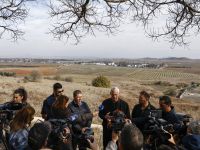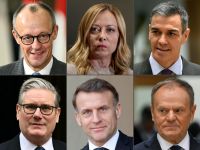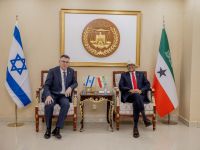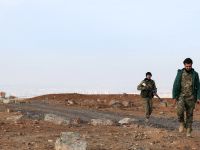World leaders renewed appeals for peace in the Middle East on Wednesday, as they backed proposals by UN Secretary General Kofi Annan to strengthen the United Nations, reported AFP.
US President Bill Clinton led the endorsements, telling the Millennium Summit --the largest gathering of heads of state and government in history -- that those "in my country or elsewhere who believe we can do without the UN or impose our will upon it, misread history and misunderstand the future."
Nations "must look for more solutions in which all sides can claim a measure of victory and move away from choices in which someone is required to accept complete defeat," he said.
Clinton noted the presence in the UN General Assembly hall of Israeli Prime Minister Ehud Barak and Palestinian President Yasser Arafat, said the agency. "They need your support now more than ever to take the hard risks for peace," he said.
"They have the chance to do it, but like all life's chances it is fleeting and about to pass," he added.
In his speech, Arafat said he would do his utmost to reach a final settlement with Israel, reported AFP.
"We shall continue to do our utmost during the coming short period of time, in order to arrive at a final settlement between Palestine and Israel, and we invite the Israeli government to do likewise," Arafat told the UN Millennium Summit.
He was inflexible on Jerusalem, the thorniest question in the half-century long Israeli-Palestinian conflict.
"We remain committed to our national rights over east Jerusalem, capital of our state and shelter of our sacred sites," he declared.
But, having condemned what he called "Israeli attempts to Judaize Jerusalem," he stressed that the Palestinians had agreed to share the holy city with other faiths.
Barak, for the first time, recognized in his speech that Jerusalem is sacred to Palestinian Muslims.
"We recognize that Jerusalem is also sacred to Muslims and Christians the world over, and cherished by our Palestinian neighbors," the speech read.
But he asked UN member states to stop Arafat taking "any unilateral measures, which may spark a renewed cycle of violence and obliterate the prospects of peace," said AFP.
Meanwhile, African speakers called for the United Nations and its members to address the root economic causes, reported the Washington Times newspaper.
Algerian President Abdelaziz Bouteflika, the chairman of the Organization of African Unity, decried how the world's wealthy countries continued to get richer while Africa's poor suffered under crushing debt, said the paper.
"Can we one day free ourselves of this crushing yolk and at last devote our resources to our development and the well-being of our populations?" he asked.
Mozambique President Joaquim Chissano complained that Africans weren't reaping the benefits of globalization and were in fact suffering even greater economic inequalities while also trying to deal with the AIDS epidemic, added the paper.
Meanwhile, Russian President Vladimir Putin told his Iranian counterpart Mohammed Khatami on Wednesday that he viewed Teheran as Moscow's strategic partner and a key player in the Middle East, said AFP.
"I am happy to finally meet you. Iran is our traditional partner," a grinning Putin told Khatami at the start of their closed-door talks on the sidelines of the UN Millennium Summit.
"Ties between our countries have been building for many years, many decades," Putin said.
Earlier Wednesday, in an apparent reference to his own views of US dominance in world affairs, Khatami told some 150 heads of state and government gathered for the summit that the United Nations must treat all members equally and not yield to the "quest of power."
Khatami was due to have addressed the summit on Wednesday afternoon, according to the official schedule, but was switched to speak earlier while US President Bill Clinton was still in the UN General Assembly hall, according to AFP.
"I declare before this house that nations can no longer be excluded or marginalized on political, cultural and economic pretexts," Khatami said.
Outside the hall, New York's streets gave an alternative podium to commoners.
In the largest demonstration, about 2,000 followers of the Falun Gong spiritual movement marched from China's UN mission to the United Nations, protesting Beijing's crackdown against the sect, reported the MSNBC.com
There were others who protested slavery in Sudan, and still others who objected to the Middle East peace process, said the MSNBC.
Aggrieved Iranians, Bangladeshis and anti-Castro Cubans assembled across the street from the UN headquarters.
When the summit ends on Friday, it is expected to adopt a Millennium Declaration that includes specific targets for reducing extreme poverty, illiteracy and AIDS over the next 15 years, said AFP - (Several Sources)
© 2000 Al Bawaba (www.albawaba.com)







